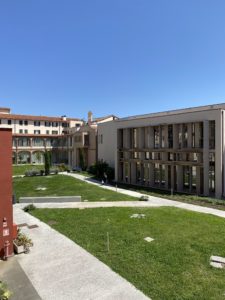Presentazione
(for English version see below)
 Il dottorato di ricerca in Scienze dell’antichità e archeologia – Progetto Pegaso è un consorzio tra le tre università di Firenze, Pisa e Siena con sede amministrativa presso l’Università di Pisa.
Il dottorato di ricerca in Scienze dell’antichità e archeologia – Progetto Pegaso è un consorzio tra le tre università di Firenze, Pisa e Siena con sede amministrativa presso l’Università di Pisa.
Il suo collegio comprende docenti di università italiane e straniere. Il Dottorato attribuisce per concorso borse di studio a qualificati concorrenti nell’ambito delle discipline di scienze dell’antichità e archeologia, accompagnandone la formazione nel triennio con una ricca e articolata offerta didattica informata da interdisciplinarietà e da apertura ai nuovi approcci metodologici. Il suo regolamento interno rispecchia il regolamento generale del dottorato dell’Università di Pisa. Gli studenti devono trascorrere in sedi non italiane un periodo di formazione pari a sei mesi, che può essere anche suddiviso in più periodi.
Il dottorato regionale intende promuovere la presa di coscienza della sostanziale unità degli obiettivi della ricerca nel campo degli studi sul mondo antico e, tramite l’accorpamento di precedenti programmi di dottorato delle Università di Firenze, Pisa e Siena, omogenei nelle metodologie e nelle prospettive della ricerca, si pone l’obiettivo di formare dottori capaci di affrontare tematiche originali con adeguati e innovativi strumenti teorici e pratici per lo studio del passato, la memoria e la valorizzazione dei beni culturali.
Il dottorato regionale prosegue e incrementa il livello d’internazionalizzazione precedentemente raggiunto dai programmi, con la partecipazione, sia nel collegio che nelle attività formative, di docenti stranieri, l’apertura a studenti di paesi esteri, il soggiorno all’estero dei dottorandi, lo svolgimento di lezioni e seminari in inglese o in altre lingue (francese, spagnolo e tedesco), la cotutela delle tesi con università straniere anche al fine del conseguimento del titolo di Doctor Europaeus.
Il progetto si articola in due curricula:
- Archeologia
- Filologia classica
Fino al XXXVIII ciclo il dottorato prevedeva anche un curriculum di Antropologia
Sbocchi occupazionali
L’obiettivo è la creazione, attraverso la formazione didattica e la ricerca, di figure professionali con competenze tecniche, pronte per sbocchi occupazionali nella ricerca sul mondo antico, nell’insegnamento delle università e delle scuole, nei musei e nelle sovrintendenze, nelle strutture di tutela, nelle biblioteche, nell’editoria e nella comunicazione o nell’industria culturale, fra giornalismo e Digital Humanities, nella creazione di eventi o mostre di rilievo pubblico oltre che in campo imprenditoriale.
Come è ormai riconosciuto, dalla ricerca sul mondo antico, per le difficoltà nella ricostruzione in base a testi, documenti, reperti spesso incompleti o frammentari, deriva un esercizio di capacità combinatorie che rende la formazione degli allievi flessibile, in fertile rapporto con le richieste più complesse della realtà economica e sociale del nostro tempo.
Responsabile del sito: prof. Alessandro Russo email: alessandro.russo@unipi.it
Presentation
 The Doctoral School in Sciences of Antiquity and Archaeology – Project Pegaso (Scienze dell’Antichità e Archeologia – Progetto Pegaso) is a consortium of the three Universities of Florence, Pisa and Siena. The administrative centre is located at the University of Pisa.
The Doctoral School in Sciences of Antiquity and Archaeology – Project Pegaso (Scienze dell’Antichità e Archeologia – Progetto Pegaso) is a consortium of the three Universities of Florence, Pisa and Siena. The administrative centre is located at the University of Pisa.
The academic board is comprised of professors and researchers from Italian and foreign universities. The Doctoral School offers scholarships to eligible candidates in the disciplines of ancient sciences and archaeology through a competitive process. These scholarships are awarded for a three-year period and include a comprehensive and multifaceted didactic programme that emphasises interdisciplinary collaboration and receptivity to novel methodological approaches. The regulations governing the programme are in accordance with those established for the doctoral programme at the University of Pisa. It is required that students undertake a period of training at an overseas academic institution for a minimum of six months, which may be divided into multiple periods.
The programme is designed to foster awareness of the substantial unity of research objectives in the study of the ancient world. It does so by integrating previous doctoral programmes offered by the Universities of Florence, Pisa and Siena, which were based on the same methodologies and research perspectives. Doctoral students will be equipped with the ability to address original themes through the utilisation of appropriate and innovative theoretical and practical tools for the study of the past, memory and the enhancement of cultural heritage.
The regional PhD programme aspires to build upon and enhance the level of internationalisation achieved by those that have preceded it. The academic board of the institution includes professors and researchers from foreign universities. Foreign students are welcome to apply. Doctoral students are required to have research stays abroad. Lectures and seminars are held in not only Italian, but also English, French, Spanish and German. The programme also offers strong support for cotutelle agreements with foreign universities, including the possibility of being awarded the title of Doctor Europaeus.
The programme is structured around two distinct curricula.
- Archaeology
- Classical Philology
Until the 38th cycle, the PhD included also an Anthropology curriculum.
Occupational outlets
The objective is the creation, through teaching and research, of professional figures with technical expertise, ready for employment opportunities in research on the ancient world, in teaching at universities and schools, in museums and in government departments responsible for monuments, in heritage conservation structures, in libraries, in publishing and communication or in the cultural industry, between journalism and digital humanities, in the creation of events or exhibitions of public importance as well as in the self-entrepreneurial field.
It is widely acknowledged that research into the ancient world is an exercise in combinatory skills. This is due to the difficulties in reconstructing on the basis of texts, documents and findings that are often incomplete or fragmentary. As a result, students’ training is flexible and fruitful, and in a fruitful relationship with the more complex demands of the economic and social reality of our time.
Website manager: prof. Alessandro Russo email: alessandro.russo@unipi.it
